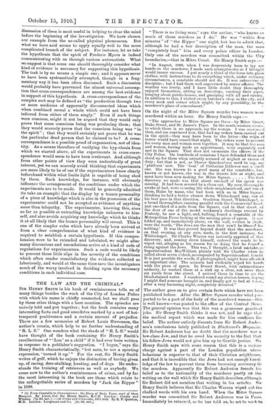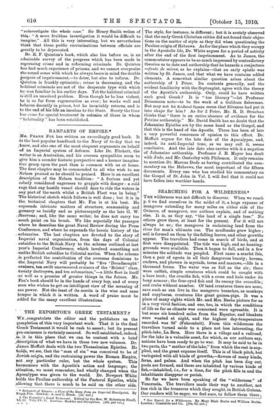THE LAW AND THE CRIMINA T i .* Silt HENRY SMITH in
his book of reminiscences tells us of many things besides the work of the City of London Police with which his name is chiefly connected, but we shall pass by these other things with a bare mention. The episodes are naïvely told and put together ; but the book contains many interesting facts and good anecdotes marked by a sort of hot- tempered positiveness and a certain amount of prejudice. There are a few memories of Robert Louis Stevenson, the author's cousin, which help to no further understanding of "R. L. S." One wonders what the shade of "H. L. S." would have thought of the book containing Sir Henry Smith's recollections of "'Lou' as a child" if it had ever been written in response to a publisher's suggestion. "I began," says Sir. Henry Smith characteristically, "but soon, to use a sporting expression, turned it up.'" For the rest, Sir Henry Smith writes of golf, which he enjoys the distinction of having given up, of racing, deer-stalking, hunting, and of dogs. He under- stands the training of retrievers as well as anybody. We come now to the author's reminiscences of crime, and by far the most interesting in the book are those which relate to the unforgettable series of murders by "Jack the Ripper" in 1888.
(1) From Constable; to Commissioner : the Story of Sixty Years, most of them Misspent. By Lieut.-Col. Sir Henry Smith, K.C.B. London Chatto and Windus. [75.6d. net.]—(21 Crime and Criminals, 1575- 1910. By E. F. Quinton, M.D. London: Longinans and Co. [4.s. 65. net.]
" There is no living man," says -the author, " who knows as much of those murders as I do." He was " within five minutes " of " the Ripper " one night, but has to admit that, although he had a fair description of the man, the man " completely beat" him and every police officer in London. Only one of the murders was committed within the City boundaries,—that in Mitre Court. Sir Henry Smith says :—
"In August, 1888, when I was desperately keen to lay niy hands on the murderer, I made such arrangements as I taught would insure success. I put nearly a third of the force into plain clothes, with instructions to do everything which, under ordinary circumstances, a constable should not do. It was subversive of discipline ; but I had them well supervised by senior officers. The weather was lovely, and I have little doubt they thoroughly enjoyed themselves, sitting on door-steps, smoking their pipes, hanging about public-houses, and gossiping with all and sundry. In addition to this, I visited every butcher's shop in the city, an] every nook and corner which might, by any possibility, be the murderer's place of concealment."
On the night of the Mitre Square murder two women were murdered within an hour. Sir Henry Smith says :—
" The approaches to Mitre Square are three—by Mitre Street, Duke Street, and St.-James's Place. In the south-western corner, to which there is no approach, Lay the woman. I was convinced then, and am convinced now, that had my orders been carried out in the spirit—they may have been to the letter—the reign of terror would have ceased that night. The orders were to account for every man and woman seen together. It may be that the man and woman, having made an appointment, went separately and met in the Square. That does not exonerate the officers of tho. City Police. On hundreds of occasions I have defended them and stood up for them when unjustly accused of neglect or excess of duty; but that is not, as Shaver Qua,ckenboss used to say, in 'platform' now. The 'beat' of Catharine Eddowes was a small one. She was known. to a good many of the constable", but, known or not known, she was in the streets late at night, and; must have been seen making for Mitre Square The that discovery we made was that about one-half of the apron was missing. It had been severed by a clean cut. My men, thoroughly awake at last, were sc3uring the whole neighbourhood, and .one of them, Halse by name, who had been with us in Mitre Square, thinking he had a better chance down Whitechapel way, ran at his best pace in that direction. Goulston Street, Whitechapei, is a broad thoroughfare running parallel with the Commercial Road, just one-third of a mile from the Square, and in that street, at the door of one of the model workmen's dwellings erected by Peabody, he saw a light, and, halting, found a constable of the Metropolitan Force looking at the missing piece of apron. It was folded up, and immediately above, on the wall, written in elialk, were the words, The Jews are the men that won't be blitined for nothing.' It was thus proved beyond doubt that the .murderer, on that evening, at any rate, made, in the first instance, • for Whitechapel. Sir Charles Warren was instantly apprised of this discovery, and, coming down himself, ordered the Words to be- wiped out, alleging as his reason for so doing that he le-artia rising against the Jews. This was, I thought, a fatal mistake, an - Superintendent MacWilliam plainly told Sir Charles :when. he - called about seven o'clock, accompanied by Superintendent Arnold. It is just possible the words, if photographed, might have afforded. an important clue. The assassin had evidently wiped his. hands with the piece of apron. In Dorset Street, with extraordinary audacity, he washed them at a sink up a close, not more than six yards from the street. I arrived there in time to see the - blood-stained water. I wandered round my station-houses, hoping- I might find someone brought in, and finally got to bed at 13 a.m., after a very harassing night, completely defeated." . .
The author goes on to give certain facts which have not been. published before. After the Mitre Square murder. what pur- ported to be a part of the body of the murdered Woman—this is well known—was posted to the office of the Central News. The general opinion was that this was a gruesome practical joke. Sir Henry Smith thinks it was not, and he says that the medical report which was made for 'hint *confirms hie: belief. The author entirely dissents from Sir Robert'. Ander- son's conclusions lately published in Blacktcood's Magaziac. Sir Robert Anderson has no doubt that the murderer 'was a low-class Jew, and that he owed his security•to the Pact that his fellow-Jews would not give him up to Gentile justice. Sir Henry Smith says with some reason that this is a serious charge against a part of the London population whose behaviour is superior to that of their Christian neighbours,
and that it is incredible that the Jews had not enimigh'knovi- ledge of the law to prevent them from becoming accessory to the murders. Apparently Sir Robert Andereoit founds his belief as to the nationality of the murderer Partly on the writing on the wall which'Sir Henry Smith describes, although Sir Robert did not mention that writing in his articles. Sir Henry Smith believes that Sir Charles Warren wiped out the chalked words with his own hand. When the Mitre Square murder was committed Sir Robert Anderson was in Paris.
Immediately be returnld, as he bas told us, he set to work-to "reinvestigate the whole case." Sir Henry Smith writes of the*: "A more fruitless investigation it would be difficult to imagine.". All this is very interesting, but we nevertheless think that these public recriminations between officials are greatly to be deprecated.
Dr. .R. F. Quinton's book, which also lies before us, is an admirable survey of the progress which has been made in repressing crime and in reforming criminals. Dr. Quinton has had much experience of prisons, and we cannot overpraise the sound sense with which he always bears in mind the double purpose of imprisonment,—to deter, but also to reform. Dr. Quinton is frankly optimistic; crime is decreasing, and the habitual criminals are not of the desperate type with which he as fain' iliar in his earlier days. Yet the habitual criminal 'still an unsolved problem. Even though he be less violent, he ie. as fer from regeneration as ever; he works well and behaves decently; in prison, but he invariably returns, and is to theend of his life an incubus to the State. Surely the time has come for special treatment in colonies of those in whom ' habituality ".has been established.















































 Previous page
Previous page